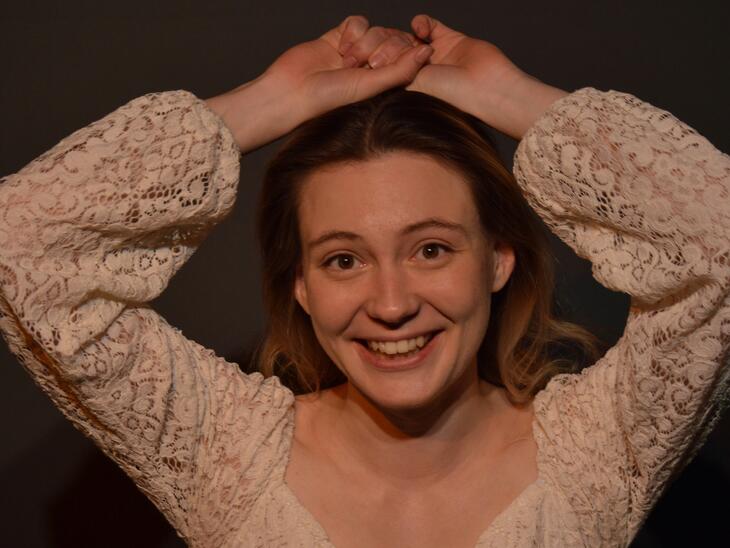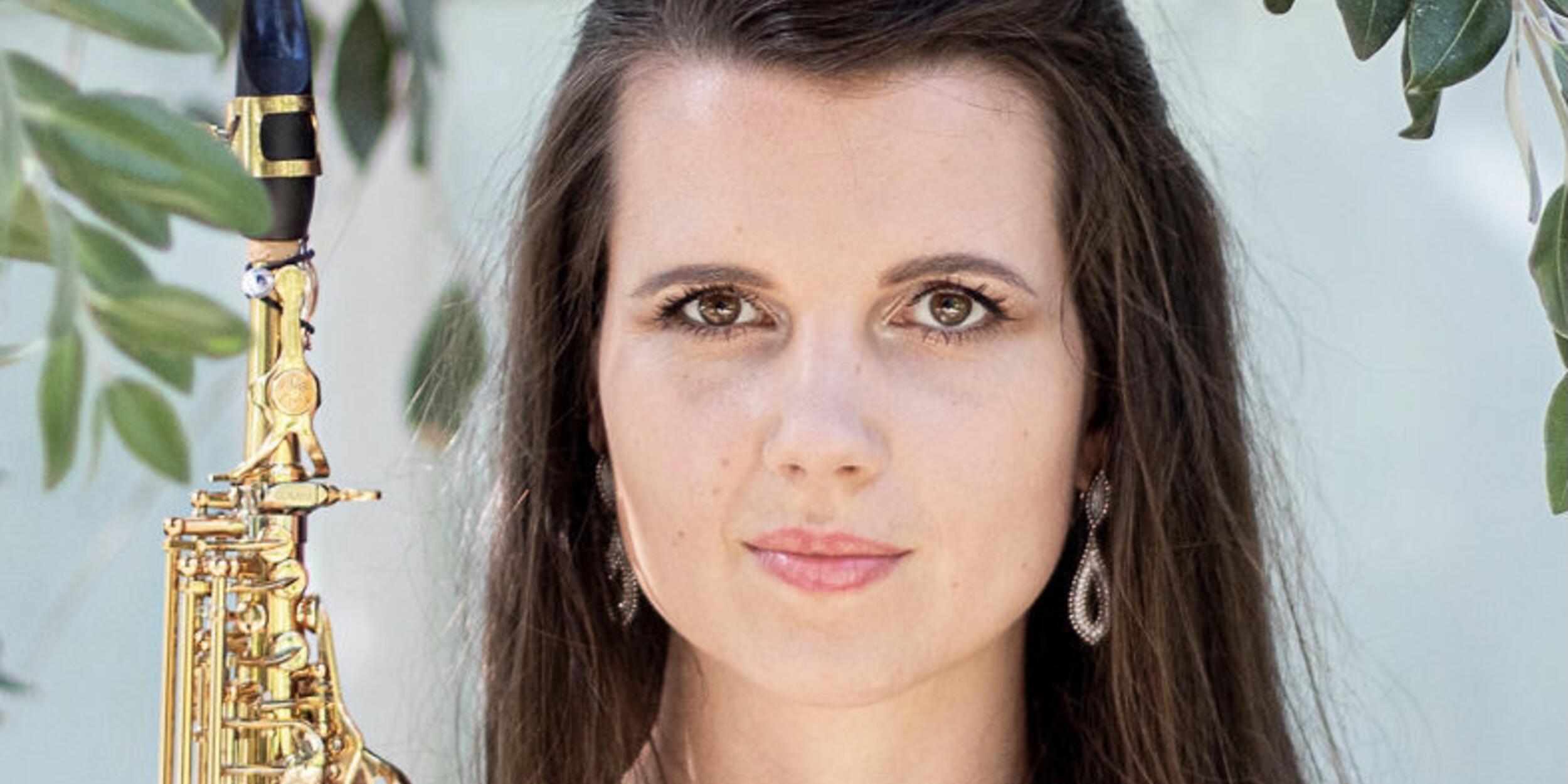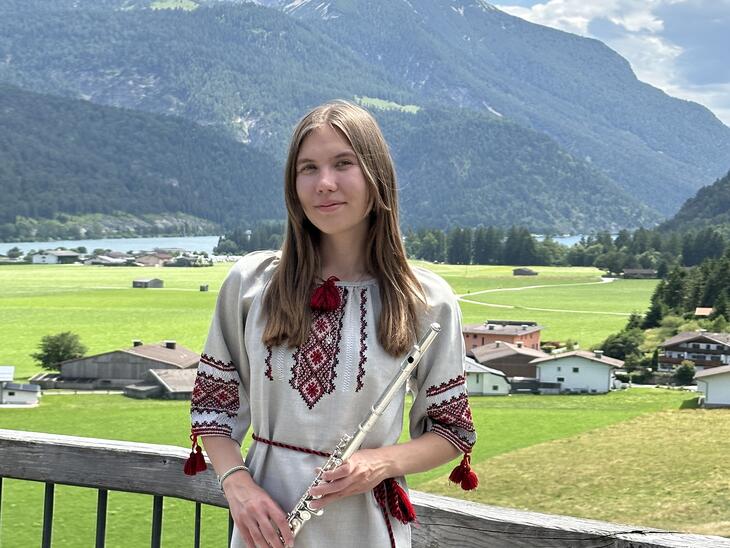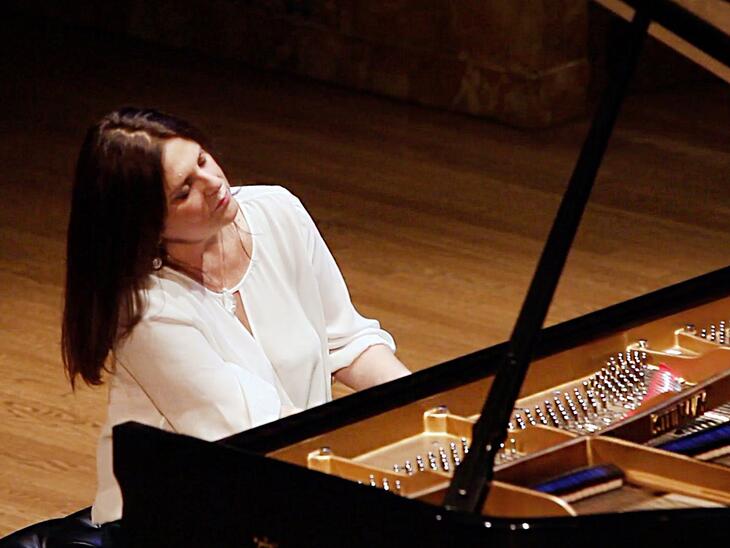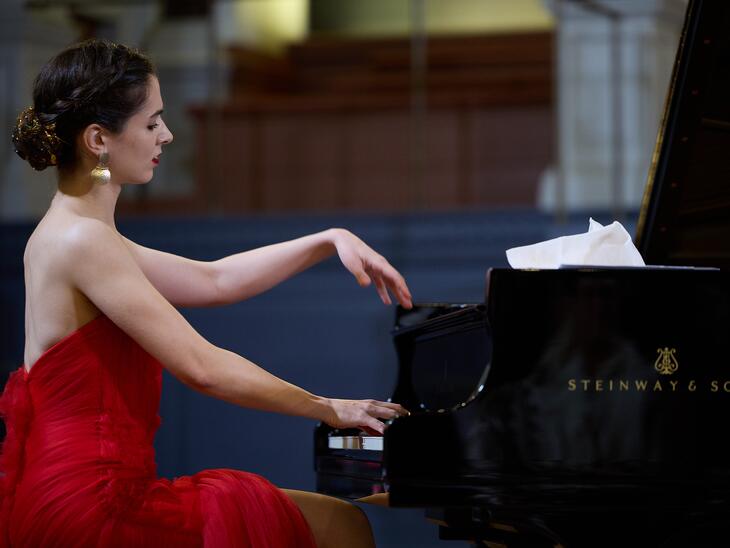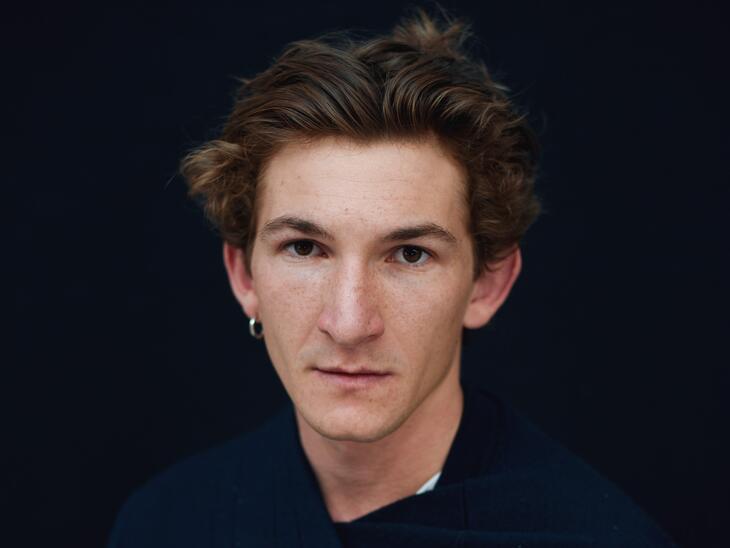With "Saxophone in Visualization" she is also represented in multimedia projects, last November she could be heard as an orchestra member with the "Bläserphilharmonie Mozarteum" and Martin Grubinger at the Konzerthaus Vienna and recently she founded the women's ensemble "MERVE". She plays in the saxophone quartet "saXTon" as well as in the piano-saxophone duo "Kuzo&Edlbauer". Together with Barbara Neu she sets selected wines to music and thus also ventures into compositions.
That sounds quite a lot at once! What can't you do?
It is a lot yes, that's true. I have a lot of interests and like to try myself out. I have found that it is good for me to focus on several things, as it keeps me mentally agile. For me, it's important that things happen. Not everything is planned that way from the beginning. It develops and some things are discarded or continued in a different form. But you have to like to challenge yourself again and again. Constantly stepping outside my own comfort zone is very important to me. The best way for me to do that is to put myself in the mindset of what I'm going to feel like afterwards, even before I complete a task.
Still, there is an incredible amount I can't do. I have great respect for the almost inexhaustible knowledge of some saxophonists and musicians about the standard repertoire, the historical embedding and the resulting brilliant interpretations of existing works. One international master class that comes to mind is the one in Arosa organized by Lars Mlekusch. I find the creative creation and composition of music just as remarkable. I am fascinated by the naturalness with which musicians in the jazz scene are familiar with bringing their own ideas into the world. I myself am not a composer, I have not studied for it, but I work with what I have. My school music studies at the Mozarteum are a good background, which I like to call a "decathlon study". You have to be good at many things, and you have to be good at a remarkably high artistic level. Often it is those things that were dubbed minor subjects in my studies, or that I picked up in conversations with colleagues over a cup of coffee, that are ultimately important for my artistic work. My ambition is to make artistically valuable things and to bring them to life. To do this, I use all the resources that I have collected in recent years.
I want to engage and deal with people, as well as their stories and concerns. Through music, content can be transported to different levels of society. But I don't want to say that music always has to have a purpose, you can also just enjoy it, close your eyes and lose yourself in the music.
Your latest concert with the ensemble "MERVE" deals with stories, fairy tales and legends from literature and music history. How can we imagine this concert?
One could say that you are a creative artist between worlds. What is the attraction of these different genres? It is a kind of musical reading, which brings with it the known and familiar, but also the unknown and new. From the classic Syrinx from ancient Greece to a modern Little Red Riding Hood, with a huntress instead of a hunter, the evening includes a variety of stories from diverse cultures. The focus is on women and their stories. These are women who had to stand their ground, in times when silence was demanded of them. The composition of clarinet, saxophone, viola and double bass expands through the use of language. One part is played, one part is spoken. Sometimes the two forms are interwoven. The piece is created only through the combination of music and speech. It is not the one existing supplemented by the other. The compositions were written by Judith Ferstl, who can be heard as a double bass player in the ensemble "MERVE".
How did "MERVE", an all-female ensemble, come about?
Together with the clarinetist Barbara Neu, the idea was born to initiate this project on stories and narratives of diverse cultures. The implementation was then realized with the double bass player Judith Ferstl and the violist Stefanie Kropfreiter, whom Barbara knows from her time in the Youth Symphony Orchestra. There had also been connections in the past, for example, through our student days in Vienna and Linz, respectively. We believed in the project and had an equal interest and desire to work on this thematic field musically, in terms of content and composition with an all-female ensemble. We also want to consciously bring women to the fore. In terms of content and artistically. That is still not a matter of course in the music world.
One could say that you are a creative artist between worlds. What is appealing about these different genres?
Each genre has its own focus. In classical training, you have time to study the instrument in detail, how it works, and already existing compositions. My roots are clearly in the tradition of the "classical saxophone" but also in contemporary music. The instrument has only been around since 1840, so it is comparatively young. In recent years, an extremely large amount of music has been composed for us, and the level of playability is rising rapidly. There are more and more young saxophonists who have incredible skills. There is no upper limit in sight yet. Other instruments have already passed this stage. All the influences, for example from jazz and pop, enrich me in my musical work. I don't think in genres and avoid these boundaries. It is interesting to look beyond the existing, classical. The way jazz artists work, as I have experienced it, is versatile and creative. There is composition and the spontaneous interaction, the vocal and improvisational element is very appealing. It's about what's happening in the moment. Influences from jazz have long been part of the compositions of the standard repertoire of the "classical saxophone" anyway - as it is always so nicely referred to. This term should actually be reconsidered.
How do you find the right stage for projects between the worlds?
I'm in that process right now (laughs). It tends to be more the classical stages but there are more and more organizers who also want to give space to something new. There are many new festivals emerging and some organizers in the field of jazz and new music have a wide range of content. But you have to look at the content besides the music to find the right "stage".
How did you come to combine contemporary saxophone literature, electroacoustics and visual media?
The idea came about at the beginning of my master's studies at the MUK (note: Music and Art Private University of the City of Vienna) in Vienna, where I focused on saxophone and multimedia performance. The resulting performance "Zuspielungen zuSPIELEN" is an interdisciplinary multimedia performance that I developed together with Lukas Dworschak and Saleh Rozati. Contemporary saxophone works are combined with live electronics and visuals. The two are visual artists and created the animations for the content of the pieces and took care of the interactive realization. This was preceded by a long process of dealing with a work, its composer and what he/she wants to say. One motivation is also to make it easier for the audience to access certain works or to enrich music with visual elements and to address several senses in perception. The combination of several art disciplines produces something in the Gesamtkunstwerk that would not be possible in the individual disciplines alone.
And the vine narratives? Here you also compose, don't you?
Yes, also in this project, in which I compose and arrange, several senses are addressed. In the interdisciplinary music performance Rebenerzählungen (Vine Tales), I present selected types of wine in musical-performative movements with my "Duo Annea," in which I play together with Barbara Neu. We work with winemakers from all over Austria and try to process the information we receive about the wines, the wineries and the respective regions they come from. Here, too, we want to bring together different worlds. Our team also includes the author Valerie Bachschwöll, the choreographer Sophia Hörmann, the dramaturge Maria Sendlhofer and Nino Stelzl, who is responsible for the stage design. The compositions are partly based on already existing works and partly they have been created completely new from the characteristics of the wine.
With the ensemble "LAUT." you dedicate yourself together with your colleagues to current topics in a literary, performing and musical way. What are these themes and how are they realized?
The first joint project "Beyond Beethoven" was created in 2019 and was awarded a prize in the "Creation" category at the Fidelio Competition of the MUK Vienna. Our collective is composed of the author Hurod Seekind, the violinist and violist Gregor Fussenegger, the actress Julia Mikusch and me. The project refers to the Heiligenstadt Testament, a desperate letter of Beethoven to his brothers Karl and Johann. This forms the basis of our performance. In its realization, it was a 15-minute performance in which we presented our interpretation of the Heiligenstadt Testament and confronted the audience with fundamental human questions of meaning. First and foremost was the question: "What am I"? A trailer of the work can be viewed on YouTube. From this ensemble "LAUT". a new collective was formed last year with trombonist Daniel Holzleitner. He is the first recipient of the "Joe Zawinul Prize" of the MUK Vienna. The prize was awarded to him for the realization of our interdisciplinary project "zwischen uns". In the spirit of Zawinul we deal with the interaction of language, in the form of the human voice, and music. The performance lives from the dialogical nature of this relationship. The goal of the project is the organic interaction of computer-aided sounds, acting and acoustic music. To achieve this, the boundaries between the disciplines are broken down and crossed in places, and the disciplines themselves are brought together in a meaningful way. In this working process I have learned a lot, because the approach of musicians and actors to an artistic project is completely different. The process of creation is different. What was new for me was the creation of a work during rehearsals. The creation of characters and roles, working on the overall dramaturgy. As a musician, you are used to preparing an existing work and coming to rehearsal with it, which is set for a fixed period of time. You don't usually have to think about how you stand, how you walk or how you turn. That was already very exciting. A first presentation of the Zawinul project will take place in Vienna in October 2021.
In the past year, there has been, forced, a lot of art to experience digitally. Have you also had experiences in this area? Is there possibly even a positive effect from this?
Personally, of course, I've listened to a concert via live stream every now and then, but I have to say that I'm not a fan of experiencing music and art digitally. When I put myself on stage, as an artist I transport an attitude, a mindset, which takes place non-verbally. The audience senses this consciously or unconsciously, and it is precisely these aspects that are lost through digital consumption. As a recipient, I don't leave my familiar surroundings, I don't have the ritual of getting dressed, and I lack the mental preparation for the concert evening. The art cannot unfold and reach the audience in the way it can in a live setting. If I can name something positive, it is certainly the insights into concerts and formats that would have been difficult for me to attend in terms of space and time. During the pandemic, for example, it was possible to watch a live stream from Berlin and one from Zurich on the same day. Internationally, musicians and the arts are moving ever closer together. It's also a way to quickly get new input and develop ideas.
Your projects sound like a busy schedule. But how did you get there? What do you have to keep in mind as a student? How do you start, how do you plan and what is important?
Yes, the play dates are getting more and more and I am very grateful for that. The path so far has definitely had many crossroads and forks, which has not always been easy. There have often been moments in the last few years when I doubted whether I was going in the right direction. Mainly because really no one can give an answer as to how an ensemble or formation will develop. Every group has its own dynamic and needs a different way of working, has its own pace. An important process was to be absolutely honest with myself and to be completely clear about where I want to go and where my strengths, but also weaknesses, are. And then you meet people who want to go in the same direction anyway. Personally, it is very important to me to work with musicians with whom I enjoy spending time, with whom I can exchange ideas on many levels beyond the art, apart from the fact that they are of course experts in their field. I often let my intuition decide, even though I couldn't know at the time whether a collaboration would be successful. I would advise everyone to try out as many things as possible during their studies and to remain open to all sides.
Do you have any advice for artists who are still in training?
Go to a lot of concerts, consume art in all its facets, inform yourself about what's going on and learn to manage yourself. For example, there is MICA or IG Kultur, where you can get a lot of important information for free. Support each other - both in the college and within the industry. We are all entrepreneurs, especially if you are in the independent scene. I think this is something that musicians should be even more aware of. Practicing is essential and important, but it's only part of what we should be able to do.
In which area could there have been a little more at the university?
Definitely in the area of music management and music business. For me, it would have been helpful to learn how to apply for funding and market myself while I was still a student. It would have been helpful, for example, to invite already established musicians to the university to learn from them and to be able to ask questions personally.
What do you remember particularly well from your student days?
I had a lot of time to make music and play in a wide variety of formations. For example, the "saXTon" saxophone quartet mentioned at the beginning dates back to my student days at the Bruckner University in Linz. There was also a lot of time to practice, to get to know literature and to try things out. In addition, I had very good teachers from whom I could learn a lot, not only musically but also personally. First and foremost my two main saxophone teachers Peter Rohrsdorfer and Michael Krenn.
Even if the daily work often seems like a balancing act between teaching, practicing, rehearsing, performing and organizing, it is important to me to remind myself and all of us again and again how beautiful it is to be allowed to make art. Art is a privilege for all of us! Let's try not to forget that.
